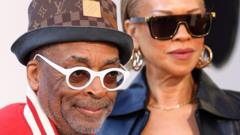The singer's remarks illuminate the multifaceted nature of cultural identity, especially for those with Irish heritage living outside Ireland. Experts highlight how changing perceptions shape the understanding of Irishness, revealing both pride and contention within communities.
The Complexities of Cultural Identity: Ed Sheeran's Take on Being 'Culturally Irish' in 2025

The Complexities of Cultural Identity: Ed Sheeran's Take on Being 'Culturally Irish' in 2025
Ed Sheeran's recent declaration of being "culturally Irish" has ignited a debate on cultural identity, reflecting the evolution of Irishness in contemporary society.
Ed Sheeran's recent assertion of being "culturally Irish" has sparked a lively discussion on cultural identity, especially amidst the evolving notions surrounding Irishness in 2025. Sheeran, who grew up in Suffolk, England, reminisced about his childhood and his connections to Ireland through his Irish grandparents and parent, depicting a longing for the verdant landscapes of his ancestors. Nevertheless, his claim to Irish identity met with criticism from some quarters, suggesting that he identifies as Irish only when convenient.
Despite facing backlash, Sheeran defended his connection to Ireland, emphasizing the cultural upbringing that shaped his musical identity. For many observers, this debate is emblematic of larger questions about belonging and heritage, particularly for second-generation Irish individuals in Britain. Scholar Ros Scanlon suggests that expressing pride in one’s Irish heritage does not diminish a person's British identity; both can coexist harmoniously.
The discourse around Sheeran's declaration brings to light ongoing transformations in identity perceptions influenced by historical context and societal attitudes. Claire Hanna, a Belfast MP, remarked on a shift towards embracing a dual identity post-Good Friday Agreement, with many choosing to identify as both British and Irish.
Professor Linda Connolly from Maynooth University articulates that identity encompasses more than mere citizenship; it reflects cultural connections and experiences. In Northern Ireland, the concept of Irishness is particularly intricate, shaped by historical tensions and evolving political landscapes.
With a rich tapestry of cultural influences from diverse figures, including musicians like U2 and the Pogues, the Irish identity has expanded beyond traditional boundaries, inviting new interpretations. Ed Sheeran's mixed heritage, influenced by both religious traditions, exemplifies this blending and highlights the ease with which contemporary artists can now embrace their Irishness in Britain.
Historically, Irish communities in Britain faced significant challenges, yet they profoundly impacted British society, contributing labor while retaining their cultural practices. With modern technological conveniences, such as affordable travel, connections to ancestral homelands have grown, fostering a renewed enthusiasm for Irish culture among younger generations.
Ultimately, the conversation around cultural identity, spurred by Sheeran's declaration, remains fluid and complex. As identity continues to evolve, the importance of mutual understanding between British and Irish communities gains prominence, necessitating ongoing dialogue facilitated by figures like Professor Nic Dháibhéid. She envisions a future where diverse identities can coexist, further enriched by the shared cultural narratives that unite rather than divide.




















